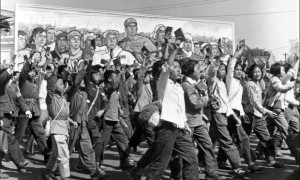Four fictional texts are bravely interwoven to tell the tale of the Great Leap Forward in this banned novel
June 1966: Chinese Red Guards and students wave copies of Chairman Mao’s Little Red Book in Beijing, at the beginning of the Great Proletarian Cultural Revolution. Photograph: Jean Vincent/AFP/Getty Images
Isabel Hilton
Sunday 29 March 2015 02.00 EDT
The remarkable Chinese novelist Yan Lianke has explained what he calls “amnesia with Chinese characteristics” as a state-administered loss of memory that the regime sees as essential to its survival. This amnesia, he has written, is achieved by shackling people’s minds, altering historical records, manipulating textbooks, controlling literature and the arts, and using financial incentives to entice people to give up their memories.
Yan Lianke himself must count as one of this strategy’s greatest failures. No other writer in today’s China has so consistently explored, dissected and mocked the past six and a half decades of Chinese communist rule. He has never been shy of treading on the Party’s toes: he has satirised the Cultural Revolution, (Serve the People!); explored the horrors of an official blood-selling scheme in his native Henan province and the Aids epidemic it caused (Dream of Ding Village), and mocked China’s move to capitalism (Lenin’s Kisses). The fortunes of these novels at the hands of the censors were mixed: some were published in China, others were published only to be withdrawn.
His most recent novel, The Four Books, now translated impeccably into English by Carlos Rojas, has proved a step too far. Banned in mainland China, it is squarely planted in a blank passage of official history, the years between 1958 and 1962, and the catastrophic events that the party created and which it continues to try to scrub from the nation’s memory. This was the time of the Great Leap Forward, Mao’s crash industrialisation scheme. Agriculture collapsed, the countryside was devastated, and up to 40 million people were starved to death. As the people starved, China was exporting the rice they had produced.
Yan has written that The Four Books took him 20 years to plan and two to write. He wrote it exactly as he wanted to, without regard for the censor. It was rejected by 20 publishers, all of whom understood that publishing it would mean they would be shut down.

